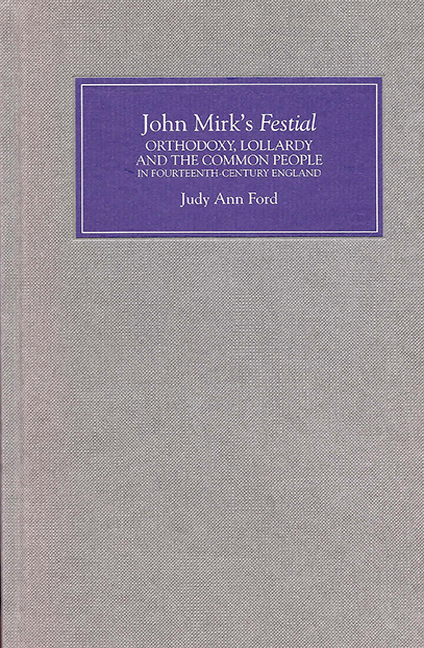Book contents
- Frontmatter
- Acknowledgements
- Contents
- Introduction: John Mirk's Festial and Fourteenth-Century England
- 1 Popular Culture and the Study of Late Medieval Piety
- 2 Clerical Power and Lay Agency
- 3 Secular Authority and Rebellion
- 4 Biblical Authority and Oral Tradition
- Conclusion: The Festial and Popular Piety in Late Medieval England
- Bibliography
- Index
1 - Popular Culture and the Study of Late Medieval Piety
Published online by Cambridge University Press: 11 May 2017
- Frontmatter
- Acknowledgements
- Contents
- Introduction: John Mirk's Festial and Fourteenth-Century England
- 1 Popular Culture and the Study of Late Medieval Piety
- 2 Clerical Power and Lay Agency
- 3 Secular Authority and Rebellion
- 4 Biblical Authority and Oral Tradition
- Conclusion: The Festial and Popular Piety in Late Medieval England
- Bibliography
- Index
Summary
‘… by defaulte of bokus and sympulnys of letture …’
(‘… by absence of books and limited skill with letters …’)
John Mirk, PrologueTelling Stories: Sermon Literature and Popular Culture
It might be thought that a text that enjoyed the popularity of the Festial would be a natural choice for scholarly investigation, but although the collection is well known it has attracted surprisingly little analysis. Certainly, its sermons are often cited by scholars who study religion in late-medieval England. Historians such as Eamon Duffy and Michael Camille refer to the Festial, as do literary critics such as David Aers. R. N. Swanson's collection of documents illustrating religion in medieval England includes one of Mirk's sermons in its entirety. The Festial is widely known and little studied in the modern academic community in spite of its medieval popularity, because popularity has not emerged as a significant criterion in the selection of sermons analyzed for the light they can shed on late-medieval religion, even in works professing to study popular movements.
It might be claimed that Mirk's sermons have attracted little attention because some scholars assume the Festial is merely a translation of The Golden Legend. The use of a Latin or other source text does not normally deflect scholarly attention. The literary works of Chaucer and Shakespeare were frequently based upon existing stories, yet no one claims Hamlet to be unworthy of study because it is a reworking of older Danish material. The derivative nature of Mirk's collection would not have been unusual for sermons at the time of its creation. As Fletcher and Powell note,
Originality was not to be praised in the Middle Ages, even in the field of literature proper. Appreciation was directed at a man's skill in the re-working of established material rather than his ability to invent new material. In the sermon field, moreover, originality and heresy were too closely linked for comfort.
And while one might object that Mirk simply reworked one conventionally orthodox text to create another conventionally orthodox text, an answer to such an objection may be found in the cautionary words of David Aers and Lynn Staley:
- Type
- Chapter
- Information
- John Mirk's FestialOrthodoxy, Lollardy and the Common People in Fourteenth-Century England, pp. 16 - 31Publisher: Boydell & BrewerPrint publication year: 2006



